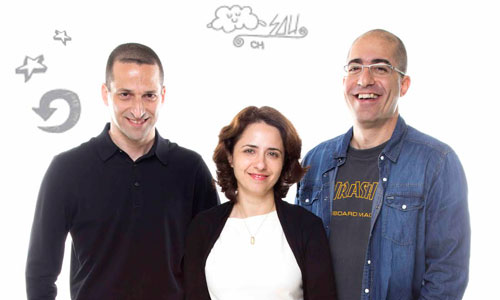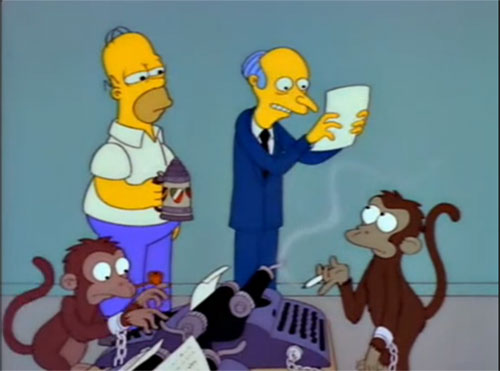When Robots Can Write
We're a long ways from a robot becoming the next great American novelist. But an Israeli startup hopes to get 'bots writing more than ever.

The Story of Tedium: Curious about where we came from? Hear it in our words: Recently, Tedium creator Ernie Smith sat down with Paul Riismandel of Radio Survior to talk Tedium. Listen here.
"It’s a bit like a more complex version of Mad Libs meets mail merge. It bears a superficial resemblance to the content-spinning tools used by spammers, but this is more sophisticated."
— Wired writer Klint Finley, describing the technology the Associated Press is using to publish automated financial stories about standard corporate earnings reports. The AP, which has been using this technology for the past two years, is, as a result of this technology, able to publish 3,700 additional stories each quarter, according to its vendor, Automated Insights. So really, automated content is being used by mainstream news outlets, but only for extreme edge cases where a human reporter could add little spin to the original piece. (In case you're hankering to try this out yourself, Automated Insights offers a data-based writing tool called Wordsmith—which you can test out for free, if you want to learn a little about robot writing. Click here to see how I convinced a robot to tell me about pizza.)

One company that's trying to use algorithms to write stories
As anyone who knows what the term agate means can tell you, newsletters used to print a lot of dull, boilerplate information. This information is still out there, and it still has value to someone, even if that someone isn't like most people. Automated Insights and its primary competitor, Narrative Science, offer that up in spades, making it possible to replace humans for some specific uses.
But what about telling a story? Not like cookie-cutter data chunks turned into sentences, but a tale with a lot of context and information. Could an algorithm someday write a breezy 2,000-word article like this one?
Nobody can currently claim that throne, but one company that appears to be closer to that goal than most is an Israeli firm called Articoolo. On loading the firm's website, it offers a promising proposition through its dialog box: Type in a couple of words, and it can spit out a 500-word article about a number of topics.
It sounds futuristic to a degree, though the firm emphasizes that its use cases should be considered more in terms of search engine optimization (SEO) than Shakespeare.
(It makes sense, then, that one of the biggest fans of Articoolo is an SEO expert.)

Articoolo core team, from left: Nir Haloani, Lilia Demidov, Doron Tal. (Handout photo)
Doron Tal, the CEO of Articoolo, says that he and his cofounders, Nir Haloani and Lilia Demidov—both of whom come from the fields of data compression and storage—got interested in the idea of improving the concept of creating content.
Haloani and Demidov worked to create the proprietary algorithms that drive the technology, while Tal looked for ways to monetize the approach.
Since receiving funding, Tal has brought on a team of employees from a mixture of disciplines, some technical like computer science, and others on the creative end of things, like marketing. (Tal himself is a serial entrepreneur who was a managing partner with the Israeli branch of the global advertising agency Publicis.)
"Although each one of us comes from a different background, we all understand that automation is about to step into the breach and take over content creation, as it has done in so many other fields," Tal tells me. "Since we couldn't find an existing solution, we decided to develop one."
So, could this replace someone with an existing job?
To put it simply, the answer to that question is no—at least for now. In fact, Articoolo emphasizes that it's not their ultimate goal at all—and that journalists have nothing to worry about, anyway.
"Journalists who have their own voice and point of view will never be replaced by a machine," Tal says when pressed about whether his technology is going to steal my job.
Instead, Tal argues for Articoolo as a potential timesaver for writers—one that can cut down on research and editing time, and potentially help make human writers a little bit faster. The algorithm is able to do some basic online research and publish up to 500 words on a given topic—not enough to replace the human hand, but enough in some cases to make the human hand a little less busy.
"We provide at least a coherent starting point, after doing all the research, aggregation, combining and rephrasing," he adds.
58%
The percentage of high school students that have admitted to plagiarism, according to a survey of 70,000 high school students done undertaken by former Rutgers University professor Donald McCabe. Articoolo's Tal admits that students may find his company's tool useful. "Students do not write their own essays anymore anyway," he said. Turns out, statistics at least partly support that stance.

Articoolo tries its hand at writing a Tedium topic
Earlier this week, I wrote about light beer, a topic that has the benefit (like many Tedium topics) of being simultaneously incredibly common and somewhat obscure.
My piece covered the way light beer is produced, and touched upon some of its early marketing.
I asked Articoolo to write me a short article about it, and here's what it gave me, with no edits for grammar. Drumroll, please …
They're appealing girls which have the features to boost the number 1 marketing light beer in the world. They get paid on average $30 each hour to speak about the Brands characteristics. Beer Girl Qualities Beer women are sexy and fun women that men love to be around. They're able to command the attention of the bar and get men to practically do whatever they need. Girls talk about the characteristics of their beer and amuse the pub guest by handing out promotional items like bottle openers and beer bracelets. Beer women are envied by other women and wanted by nearly every guy in the bar.
They're continuously posing for the camera and signing cards when they're encouraging bud light at special events. These promotional models get paid a ton of cash per hour. They could make any where from $25 to $40 each hour depending on what state they're encouraging in. Suggestions to Become a Bud Light Girl you'll find specific promotional and advertising services that employ their women to do Beer Promotions. Beer Distributors will even hire and use women they find locally. It might appear difficult for most women to become beer girls since a lot of girls are signing up to encourage beers.
Here are 4 Must do if you desire an opportunity at becoming a drink promotional model. You've to be capable to socialize and make people have a wonderful time. You should be appealing and exude confidence without being unapproachable.
As you can see, the piece struggled a bit to focus on my suggested subject of light beer, instead spending nearly all of its time discussing what it's like to be a paid marketing model at a bar, something I've always wanted to be.
Adding keywords to the mix to make it more specifically about light beer's history, or using more narrow terms like "bud light advertising," seemed to give the machine fits—it rejected my topics as too narrow, suggesting other ideas instead.
It did give me something for Miller Lite, but it's clear Articoolo's robot has a one-track mind on this topic. "Miller lite women are sexy, fun and thrilling girls to be around," the unintentionally chauvinistic algorithm wrote.
(As a test, I gave it a slightly broader term, "Nintendo Entertainment System," and it did a better job factually—highlighting Nintendo's history as a playing card manufacturer and correctly calling Nintendo "among the best video game businesses the world has ever seen." Click here to read the full piece.)
One of the company's other tools, a title generator, was more successful. After throwing in my link, it suggested the headline "Light Beer Is The Stuff That Pays For Sports Bars And Super Bowls," a quip I hadn't considered as a headline, but makes sense as one. It also offered up a few good keywords for the piece that could help me improve it down the line, along with a summary that I'd best describe as a bit of a jumble.
Not perfect by any means, but one benefit of my experiment is that Articoolo will learn from it, Tal says.
"Most of our [quality assurance] activity is about the quality of rephrasing," he explains. "We try to intercept patterns of rephrasing mistakes and 'teach' the algorithm the correct phrasing it should have used."
Tal says that the company realizes is taking on a monumental task in trying to perfect this. "We still have a lot of work to do in order to reach perfection," he says.
Perfection is a weird word, though, and the term brings up some philosophical thoughts for me. Writing is stunningly imperfect and designed to be broken. In some ways, it creates a different problem than what computers are used to: math, a subject that isn't nearly as subjective as the written word.
The challenge for Articoolo will be not to strive for perfection, but to create something with the nuance of the written word but with the ability to gather information and present it in an effective way.
And it'll need to do so without getting too distracted by "beer girls."
Obviously, Articoolo still has a ways to go before it'll be good enough to replace legitimate writers, but it is good enough for specific use cases where it's more important to hit specific keywords than it is to write a compelling, specific story.
(It can even be efficiently used for comedy, as funny person Sarah Kennedy showed on her Tumblr recently.)
Tal admits there are limits currently, but emphasizes that the technology is getting smarter every day, and says that a year from now, it'll be smarter than you'd expect.
"It will be very hard to tell that a machine writes them," he explains, adding that as the technology evolves, the algorithms become smarter contextually.
So the good news for ink-stained wretches is that Articoolo isn't good enough to replace your handy newsletter writer or around-the-way journalist. That said, based on my own playing with the tool, I do think that the technology could eventually be good enough for writing short social media updates such as tweets, which might make it a boon for media companies down the road. (ARE YOU LISTENING, TRONC?!?!?!?!?)
And Tal is optimistic about its long-term odds.
"In five years, the algorithm will already outsmart us and we will be serving him margaritas on the beach in Hawaii," he jokes.
If that happens, it would make a pretty killer story.
:format(jpeg)/2017/06/tedium081116.gif)
/2017/06/tedium081116.gif)

/uploads/ernie_crop.jpg)